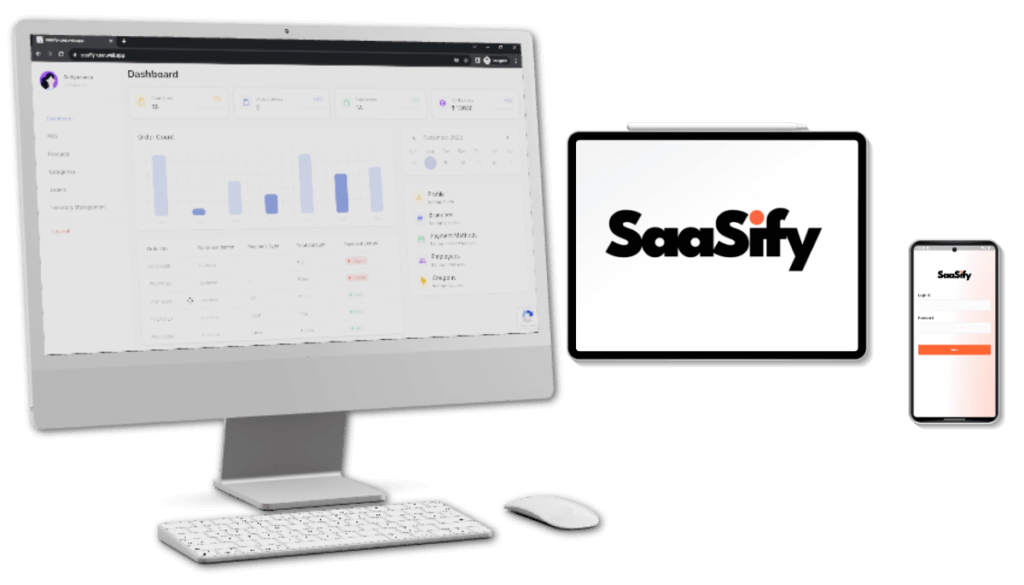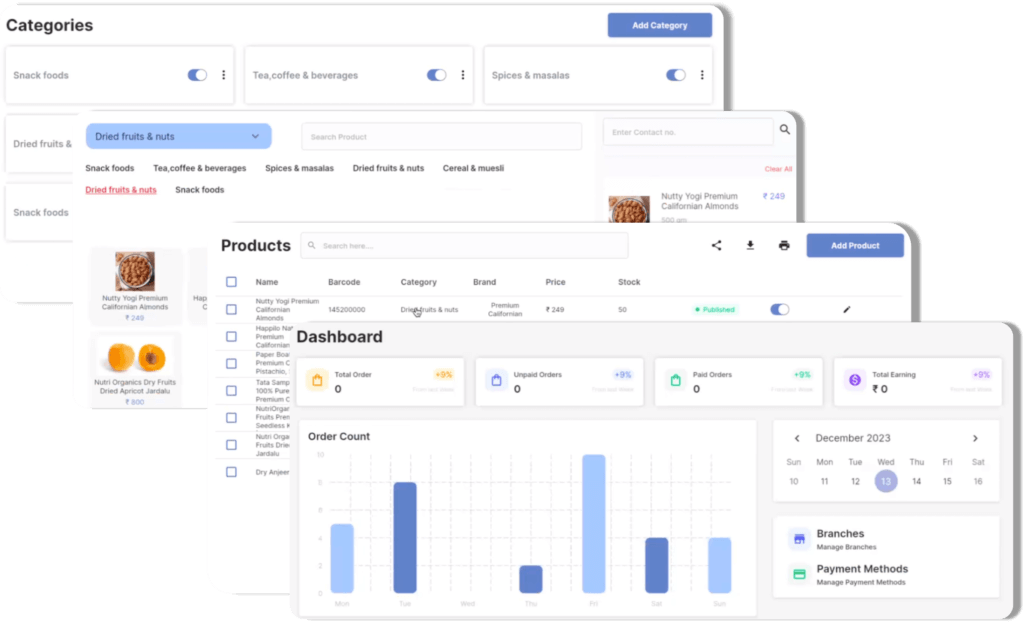Importance of POS Systems
Point of Sale (POS) systems are indispensable tools for efficient business management. These systems go beyond simple sales transactions, playing a crucial role in enhancing customer service, streamlining operations, and providing valuable insights for sustainable business growth.
A well-chosen POS system can significantly improve the overall customer experience by ensuring quick and seamless transactions at the checkout. Moreover, it empowers businesses with the ability to manage inventory effectively, optimize purchasing decisions, and prevent overstocking or stockouts. This level of control over inventory is essential for businesses to meet customer demand while minimizing unnecessary costs.
Furthermore, POS systems provide detailed analytics and reporting capabilities that offer valuable insights into sales trends, inventory turnover, and customer purchasing behavior. Armed with this data-driven information, businesses can make informed decisions to further optimize their strategies and operations.
Overall, the right POS system is a key asset for any retail, restaurant, or cafe business seeking to elevate its service standards and drive operational efficiency.

Lightspeed POS Features
Lightspeed POS is renowned for its advanced features designed to streamline operations and enhance the overall efficiency of retail, restaurant, and cafe businesses.
User-Friendly Interface
- The user-friendly interface of Lightspeed POS simplifies staff training and enhances operational efficiency. Its intuitive design ensures a seamless checkout process for customers, contributing to a positive and efficient shopping or dining experience.
Inventory Management Capabilities
- Lightspeed POS offers robust inventory management features that enable retailers to track stock levels, manage suppliers, and optimize purchasing decisions. The real-time inventory updates provided by Lightspeed POS ensure accurate stock control, preventing overstocking or stockouts and ultimately contributing to better inventory management practices.

Petpooja POS Review
Customization Options
Petpooja POS stands out for its extensive customization options, catering to the unique needs of restaurants and cafes. The system allows businesses to tailor menus, order types, and table layouts to create a personalized dining experience for their customers. By customizing these crucial elements, establishments can ensure that the POS system aligns seamlessly with their specific operational requirements, ultimately enhancing customer satisfaction.
Integration Capabilities
In addition to its customization features, Petpooja POS offers seamless integration with various third-party applications such as payment gateways and accounting software. This capability streamlines operations by facilitating efficient data management and reporting. By integrating with external systems, Petpooja POS enables businesses to centralize their data and automate processes, contributing to enhanced productivity and streamlined workflows.
Retail POS Solutions
Retail POS solutions are designed to elevate the customer experience and provide valuable insights for data-driven decision-making.
Enhanced Customer Experience
- Retail POS solutions play a pivotal role in enhancing the customer experience by enabling quick and convenient transactions. The seamless checkout process ensures that customers can complete their purchases efficiently, contributing to overall satisfaction and loyalty.
- Integrated customer relationship management (CRM) features within retail POS systems empower retailers to personalize interactions with their customers. By capturing and analyzing customer data, businesses can tailor promotions, offers, and services to meet individual preferences, ultimately fostering stronger relationships and repeat business.
Analytics and Reporting
- Retail POS solutions offer valuable insights through detailed analytics and reporting capabilities. These tools empower businesses to make informed decisions based on sales trends, inventory turnover, and customer purchasing behavior.
- By leveraging the analytical capabilities of a retail POS system, businesses can optimize their strategies to align with customer demand and market trends. This data-driven approach enables retailers to maximize profitability while ensuring that inventory levels are aligned with consumer preferences.
By combining enhanced customer experiences with robust analytics, retail POS solutions provide a comprehensive platform for businesses to thrive in competitive markets.
Restaurant POS Benefits
Order Management Efficiency
Efficient order management is essential for the smooth operation of restaurant businesses. A restaurant POS system plays a crucial role in streamlining order processing, reducing wait times, and minimizing errors in the kitchen. By automating the ordering process, restaurant POS systems ensure that orders are transmitted accurately from the point of sale to the kitchen, eliminating potential misunderstandings or delays.
Moreover, the integration of Kitchen Display Systems (KDS) and order routing capabilities further optimizes the flow of orders within the kitchen environment. KDS provides real-time visibility of incoming orders, allowing kitchen staff to prioritize tasks and maintain efficient workflow. As a result, these features enhance overall kitchen efficiency and contribute to timely and accurate order fulfillment.
The seamless coordination facilitated by restaurant POS systems not only improves operational efficiency but also enhances the dining experience for customers by minimizing wait times and ensuring consistent service quality.
Tableside Ordering and Payment
Restaurant POS systems equipped with tableside ordering and payment capabilities offer significant advantages for both establishments and their patrons. By enabling servers to take orders directly at the table using mobile POS devices, these systems improve table turnover rates and contribute to a more efficient dining experience.
Tableside ordering allows servers to promptly relay customer preferences directly into the POS system, reducing the risk of miscommunication or errors associated with traditional order-taking methods. This streamlined approach not only enhances accuracy but also expedites the entire ordering process.
Furthermore, mobile POS devices empower servers to process payments directly at the table, eliminating the need for customers to wait in line at a fixed terminal. This capability not only increases operational efficiency but also contributes to improved customer satisfaction by providing a convenient and personalized payment experience.
Overall, restaurant POS systems with tableside ordering and payment capabilities play a pivotal role in optimizing service delivery while enhancing customer satisfaction within restaurant environments.
Cafe POS Management
Menu and Ingredient Management
When it comes to cafe operations, efficient menu and ingredient management are vital components for ensuring smooth and successful service delivery. Cafe POS systems are specifically designed to facilitate these essential tasks, empowering cafe owners and managers to maintain optimal control over their menu offerings and inventory.
Cafe POS systems provide intuitive interfaces that allow cafes to update menu items seamlessly, ensuring that customers have access to the latest offerings. The real-time nature of these updates enables cafes to make immediate changes based on ingredient availability or seasonal promotions, contributing to a dynamic and responsive menu.
Moreover, ingredient-level tracking within cafe POS systems is instrumental in maintaining appropriate stock levels. By closely monitoring ingredient usage and availability, cafes can ensure the consistent availability of popular menu items while minimizing the risk of stockouts. This level of precision in inventory management is crucial for meeting customer demand and delivering a high-quality dining experience.
Overall, the menu and ingredient management capabilities offered by cafe POS systems enable cafes to operate with agility and responsiveness, ultimately enhancing customer satisfaction and loyalty.
Customer Loyalty Programs
In today’s competitive cafe landscape, establishing strong customer relationships is paramount for long-term success. Cafe POS systems play a pivotal role in supporting the implementation of customer loyalty programs, providing cafes with the tools needed to foster repeat business and cultivate loyal patrons.
Integrated loyalty features within cafe POS systems enable cafes to reward customers for their continued patronage while simultaneously tracking their purchasing behavior. By offering incentives such as points-based rewards or special promotions, cafes can encourage customers to return and engage with their brand consistently.
Furthermore, the data collected through loyalty programs equips cafes with valuable insights into customer preferences and spending patterns. This information can be leveraged to tailor promotional offers or introduce new menu items that resonate with the target audience, ultimately strengthening customer relationships and driving revenue growth.
In essence, cafe POS systems empower businesses to implement effective customer loyalty initiatives that not only incentivize repeat visits but also contribute to a deeper understanding of customer needs and preferences.
Cloud-Based POS Options
Cloud-based POS options offer unparalleled scalability and flexibility, providing businesses with the agility to adapt to evolving operational needs. The cloud-based nature of these systems allows for seamless expansion across multiple locations, enabling businesses to grow without constraints. Remote access and real-time data synchronization further enhance operational efficiency by ensuring that all locations are interconnected and up-to-date.
The inherent scalability of cloud-based POS options empowers businesses to expand their operations without the limitations imposed by traditional on-premise systems. Whether opening new branches or pop-up locations, businesses can easily integrate additional POS terminals into their existing cloud infrastructure, ensuring a consistent and unified checkout experience for customers across all touchpoints.
In addition to scalability, the flexibility of cloud-based POS systems enables businesses to operate with unprecedented agility. Remote access capabilities allow business owners and managers to monitor operations from anywhere, providing real-time insights into sales performance and inventory levels. This level of accessibility facilitates informed decision-making and ensures that businesses can respond swiftly to changing market dynamics.
Data Security and Compliance:
Cloud-based POS options prioritize data security through robust encryption protocols and regular security updates. By adhering to industry regulations and standards, these systems ensure the protection of sensitive customer and business data. Compliance with stringent security measures not only safeguards against potential breaches but also fosters trust among customers who value the privacy and integrity of their personal information.
Overall, the scalability, flexibility, and robust security measures offered by cloud-based POS options position them as essential tools for modern businesses seeking to optimize their point of sale operations while prioritizing data protection.
POS Technology Trends
In the ever-evolving landscape of point of sale (POS) technology, several notable trends are shaping the way businesses process transactions and engage with their customers. These trends represent significant advancements that have the potential to redefine the POS experience and drive innovation across various industries.
Mobile POS Innovations
The emergence of mobile POS innovations has ushered in a new era of flexibility and mobility in sales systems. Businesses are increasingly leveraging mobile POS solutions to conduct transactions seamlessly within their operational environments. Whether on the shop floor, at a trade show, or during off-site events, the portability of mobile POS devices enables businesses to engage with customers and process sales from virtually anywhere. This level of mobility not only enhances customer convenience but also empowers businesses to extend their reach beyond traditional brick-and-mortar settings.
Mobile POS devices offer unparalleled flexibility, enabling businesses to meet customers wherever they are, whether it’s on the showroom floor or at an outdoor event.
AI and Machine Learning Integration
The integration of artificial intelligence (AI) and machine learning into POS technology represents a significant leap forward in predictive analytics capabilities. By harnessing AI-driven insights, businesses can forecast customer behavior and demand patterns with greater accuracy than ever before. These predictive capabilities empower businesses to optimize pricing strategies based on real-time market dynamics and consumer preferences. Furthermore, machine learning algorithms enable businesses to personalize marketing efforts by tailoring promotions and offers to individual customer profiles.
The integration of AI and machine learning into POS technology is revolutionizing how businesses understand and anticipate customer needs, paving the way for more personalized interactions and targeted marketing strategies.
By embracing these technological trends, businesses can position themselves at the forefront of innovation while delivering enhanced experiences for both customers and employees.
Choosing a POS System
When it comes to choosing a POS system for your business, there are several key considerations that can significantly impact the efficiency and effectiveness of your operations. From scalability and ease of use to integration capabilities and total cost of ownership, evaluating these factors is essential in selecting the right POS system that aligns with your business needs.
Key Considerations
- Scalability: One of the fundamental considerations when choosing a POS system is its scalability. Businesses should assess whether the system can accommodate their growth and expansion plans. Scalable POS systems allow for seamless integration of additional terminals or locations as the business expands, ensuring that the sales system can evolve alongside the company’s needs.
- Ease of Use: The user-friendliness of a POS system is crucial for efficient operations. An intuitive and easy-to-navigate interface simplifies staff training, reduces errors during transactions, and enhances overall operational efficiency. Businesses should prioritize POS systems with a user-friendly design to streamline their checkout process and minimize training time for new staff members.
- Integration Capabilities: Evaluating a POS system’s integration capabilities is essential for ensuring streamlined operations across various aspects of the business. Integration with other software applications such as accounting systems, inventory management tools, or e-commerce platforms can enhance data management and reporting, contributing to overall operational efficiency.
- Customization Options: The ability to customize a POS system to align with specific business requirements is an important consideration. Customization options allow businesses to tailor menus, order types, and reporting features according to their unique operational needs. This level of customization ensures that the chosen POS system seamlessly integrates into existing workflows and processes.
- Customer Support: Assessing the quality and availability of customer support services offered by POS providers is crucial for addressing potential issues or technical challenges that may arise during day-to-day operations. Reliable customer support ensures timely assistance in resolving any issues related to the sales system.
- Total Cost of Ownership: Understanding the total cost of ownership associated with a POS system involves considering initial setup costs, ongoing subscription fees, hardware expenses, maintenance costs, and potential upgrade expenses. Calculating the total cost over time provides businesses with a comprehensive understanding of their investment in the chosen sales system.
Vendor Comparison and Evaluation
Conducting thorough vendor comparison and evaluation processes empowers businesses to make informed decisions about selecting a suitable POS provider.
- Feature Assessment: By comparing features offered by different POS providers, businesses can identify which functionalities are most aligned with their specific operational requirements. This assessment includes evaluating inventory management capabilities, reporting tools, integration options, customization features, and security protocols.
- Pricing Analysis: Understanding pricing structures offered by various vendors allows businesses to assess upfront costs as well as ongoing subscription fees associated with maintaining the chosen sales system. It’s essential to consider how pricing aligns with budgetary constraints while delivering optimal value in terms of features and support services.
- Support Evaluation: Evaluating customer reviews regarding support experiences with different vendors provides valuable insights into the quality of service provided by each company. Additionally, participating in product demonstrations or trial periods enables hands-on experience with each POS system before making a final decision.
Success with Alternative POS
Case Studies and Success Stories
Real-world case studies and success stories from businesses that have embraced alternative POS solutions provide compelling evidence of the tangible benefits and positive impact of adopting the right point of sale system. These narratives showcase how alternative POS systems have transformed the operations of retail and restaurant establishments, leading to enhanced customer experiences and streamlined business processes.
In a notable case study, a boutique retail store implemented an alternative POS solution to replace their outdated sales system. The new POS technology not only facilitated faster and more accurate transactions but also provided in-depth analytics that guided inventory management decisions. As a result, the store experienced improved sales performance, reduced instances of overstocking, and gained valuable insights into customer purchasing behavior.
Similarly, a family-owned restaurant achieved remarkable success after transitioning to an innovative POS platform tailored specifically for the food service industry. By leveraging advanced order management features and seamless integration capabilities, the restaurant significantly reduced order processing times and enhanced overall kitchen efficiency. This transformation led to higher customer satisfaction levels, increased table turnover rates, and ultimately boosted revenue for the establishment.
These real-world examples underscore how alternative POS solutions have the potential to revolutionize traditional business operations by delivering measurable improvements in efficiency, customer satisfaction, and profitability. They serve as compelling testimonials for businesses considering the adoption of modern point of sale technology as a strategic investment in their long-term success.
Future of POS Technology
The future landscape of point of sale (POS) technology is characterized by ongoing advancements in mobility, artificial intelligence (AI), and data analytics, offering businesses unprecedented opportunities for growth and innovation. As technology continues to evolve, innovative POS solutions are poised to further enhance operational efficiency, customer engagement, and business intelligence across diverse industries.
One prominent trend shaping the future of POS technology is the increasing integration of mobility into sales systems. Mobile POS innovations are redefining traditional transaction processes by enabling businesses to conduct sales seamlessly outside conventional brick-and-mortar settings. This level of flexibility empowers businesses to engage with customers wherever they are, whether it’s at pop-up events or outdoor venues, thereby expanding their reach beyond physical storefronts.
Furthermore, AI-driven insights derived from advanced POS systems are revolutionizing how businesses understand and anticipate customer needs. By leveraging predictive analytics capabilities powered by AI and machine learning algorithms, businesses can optimize pricing strategies based on real-time market dynamics while personalizing marketing efforts to align with individual customer profiles. This data-driven approach enables businesses to deliver more personalized interactions while driving targeted marketing strategies that resonate with their target audience.
Embracing POS Technology
In today’s dynamic business landscape, embracing POS technology is not just an option but a strategic imperative for businesses seeking to optimize operations, enhance customer experiences, and drive sustainable growth. The right POS system serves as the cornerstone of efficient sales management, empowering businesses with valuable insights, streamlined processes, and the flexibility to adapt to evolving market demands.
- Streamlined Operations: Implementing a robust POS system streamlines day-to-day operations by automating transaction processes, inventory management, and reporting. This level of automation minimizes manual errors and frees up valuable time for staff to focus on delivering exceptional customer service.
- Enhanced Customer Experiences: A well-integrated POS system contributes to seamless checkout experiences and personalized interactions with customers. By leveraging customer data and preferences stored within the POS system, businesses can tailor their services to meet individual needs, fostering stronger relationships and repeat business.
Strategic Flexibility: Embracing POS technology provides businesses with the agility to respond swiftly to changing market dynamics. From adapting pricing strategies based on real-time insights to introducing new products aligned with consumer demand, a modern POS system equips businesses with the flexibility needed to thrive in competitive environments.
Enter SaaSify POS by SAYGE
Building on the exploration of established POS systems like Petpooja POS and Lightspeed POS, it’s crucial to consider emerging alternatives that offer tailored solutions for modern business needs. Enter SaaSify POS by SAYGE, a versatile and cost-effective POS system designed to meet the specific demands of cafes, restaurants, and retail shops. With its user-friendly interface, real-time inventory management, and insightful analytics, SaaSify POS stands out as a smart choice for businesses seeking efficiency and growth. In this article, you will learn how SaaSify POS not only competes with but also provides unique advantages over traditional options, making it an ideal alternative for businesses aiming to streamline operations and enhance customer experience.

SaaSify POS is distinguished by its tailored approach to budget constraints, ensuring businesses only pay for what they need. The system is built to adapt to the ever-changing landscape of retail and service industries, combining cutting-edge technology with simplicity. This adaptability ensures that businesses are not only able to meet current demands but are also prepared for future challenges
.
Inventory management is another strong suit of SaaSify POS, with robust tracking tools that alert users when supplies are low, ensuring that businesses never miss a sale due to out-of-stock items. Additionally, the system offers valuable data-driven insights into sales trends, peak times, and customer preferences, which are crucial for informed decision-making
.
Moreover, SaaSify POS emphasizes the importance of seamless integration with other business tools and software, enhancing operational efficiency. It guarantees secure transactions, which is vital for building trust with customers and complying with industry standards. The system also offers customization and scalability options, allowing it to grow with your business

.
In conclusion, SaaSify POS by SAYGE positions itself as a cost-effective, versatile, and user-friendly POS system that caters specifically to the unique needs of small to medium-sized businesses. Its focus on essential features, ease of use, and adaptability makes it a compelling alternative to more established POS systems.
Start with SaaSify POS
Request your free personal Demo
Requesting a demo of our state-of-the-art POS software is your first step towards streamlining your business processes, enhancing customer satisfaction, and boosting your sales.

It’s a product built not just with code, but with a dedication to enrich your business, ease your daily tasks, and help you grow. We are proud to present this to you and look forward to being a part of your journey to success.
— Rucha Wajpe, Developer
POS Details
User-Friendly Interface
Inventory Management
Sales Reporting and Analytics
Customer Management
Employee Management



